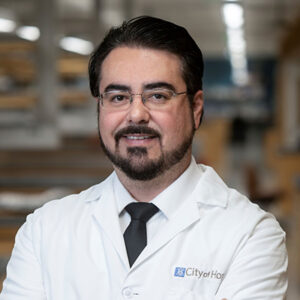In the rapidly evolving field of oncology, the integration of big data and artificial intelligence is revolutionizing our approach to cancer research and treatment. The future of precision oncology requires integrating computational approaches with clinical practice.
At City of Hope, our team combines traditional clinical expertise with advanced computational methods to extract actionable insights from complex data. Through this work, we identify novel targets, develop predictive biomarkers, and design targeted therapies tailored to patient-specific tumor biology.
One of our research focus areas is understanding the genetic and environmental factors contributing to colorectal cancer, particularly in Hispanic/Latino populations. The increasing and alarming trends in early-onset colorectal cancer among young Hispanic and Latino individuals prompted investigation into what could be the underlying causes. By analyzing clinical, genomic, and social determinants of health data, we aim to identify patterns and develop targeted interventions.
At the recent American Association for Cancer Research (AACR) Annual Meeting, my lab presented findings from our study using advanced sequencing and the 10x Genomics Visium platform to examine early-onset colorectal cancer in Hispanic/Latino patients from Los Angeles. The platform enables spatial transcriptomics that precisely map which genes are activated or silenced in specific regions of tumor tissue, providing critical insights into tumor-immune interactions at a molecular level. This work revealed distinct cellular subpopulations with unique mutational profiles and demonstrated specific immune-cancer cell interactions that may explain the disproportionate disease burden in this population.
As I envision the future, I see PM-AI providing automated DNA and RNA integration for clinicians before they enter the surgical room or clinic, summarizing complex data in a practical way that enables better treatment decisions for each patient at an individual level.
When I see cancer, I see an adaptation of cells responding to their environment. In our lab, we view data as the heart of discovery—dynamic and constantly changing, much like the cells we study. By mapping cancer cell evolution at the single-cell level and identifying susceptible subpopulations, we can understand how these cells group together with similar mutations, creating what I describe as a disruption of the “DNA software.” This perspective allows us to develop targeted therapeutic strategies that address the specific patterns and mutations contributing to the health disparities we observe in early-onset disease.
Central to our approach is our proprietary Precision Medicine Artificial Intelligence Agent (PM-AI), which we also introduced at the AACR Annual Meeting. This cognitive model accelerates research by rapidly integrating multimodal datasets — clinical phenotypes, genomic profiles, and social determinants of health — to identify patterns within hours rather than weeks.
Unlike general AI models, our system is developed specifically for cancer research, with no language restrictions and a focused training on clinical data, genomic information, and scientific literature. As I envision the future, I see PM-AI providing automated DNA and RNA integration for clinicians before they enter the surgical room or clinic, summarizing complex data in a practical way that enables better treatment decisions for each patient at an individual level. These systems represent the next step in the AI revolution for cancer research, allowing us to process information at speeds and depths impossible for humans alone.
Dr. Velazquez Villarreal is a physician-scientist and computational geneticist with more than 15 years of experience in translational multi-omics research, with a particular emphasis on addressing colorectal cancer health disparities in Hispanic/Latino communities. He is the recipient of the 2025 AACR Minority and Minority Serving Faculty Scholar in Cancer Research Award.
Listen to Dr. Velazquez Villarreal on City of Hope’s new podcast, “On the Edge of Breakthrough: Voices of Cancer Research.” Available on Spotify, Apple Podcasts and at cityofhope.org/edge-of-breakthrough.
City of Hope® is one of the largest and most advanced cancer research and treatment organizations in the U.S., with its National Medical Center named top 5 in the nation for cancer by U.S. News & World Report. To learn more about City of Hope, visit: www.cityofhope.org.








